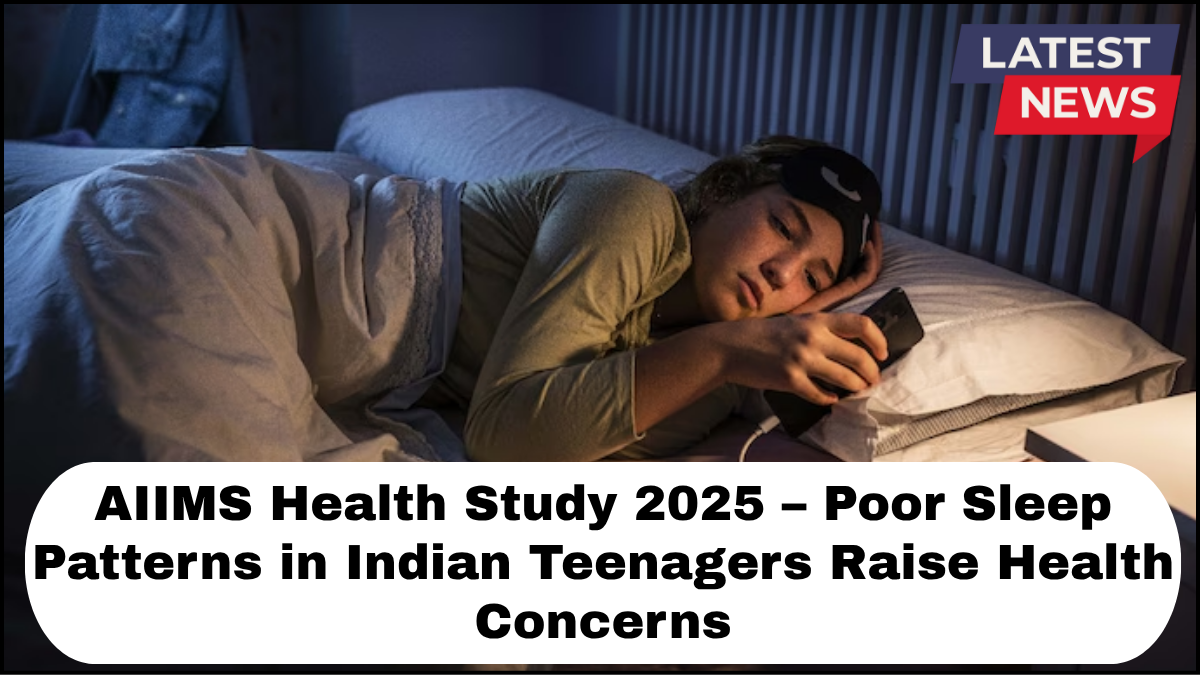A new wave of concern is sweeping across the Indian healthcare landscape. According to the AIIMS Health Study 2025, a comprehensive report released by the All India Institute of Medical Sciences, a significant number of Indian teenagers are grappling with poor sleep patterns—a trend that could have long-term consequences on their physical, emotional, and cognitive health.

The Growing Sleep Crisis Among Teenagers
The AIIMS Research 2025 highlights a sharp rise in sleep deprivation among teenagers, attributing it to a mix of academic pressure, excessive screen time, irregular schedules, and poor sleep hygiene. On average, Indian adolescents are sleeping less than six hours a night, well below the National Sleep Foundation’s recommended 8–10 hours for individuals aged 13–18.
The report also notes that many teens stay awake past midnight, often engaging in social media, gaming, or binge-watching content, which disrupts their circadian rhythm. These altered sleep patterns in teenagers are not only becoming normalized but also dangerously underestimated.
Health Implications of Poor Sleep in Adolescents
The AIIMS Health Study 2025 draws strong connections between chronic sleep loss and various health complications. Some of the key findings include:
-
Mental Health Disorders: Sleep-deprived teens are significantly more prone to anxiety, depression, and mood swings. The research found that teens getting less than six hours of sleep were 60% more likely to report symptoms of depression.
-
Cognitive Decline: Impaired memory, poor concentration, and reduced decision-making abilities are common among those with irregular sleep schedules. This adversely affects academic performance and learning capabilities.
-
Obesity and Metabolic Issues: A disturbed sleep cycle affects hormone regulation, particularly those related to hunger and metabolism. Teens with disrupted sleep patterns were found to have higher BMI levels and a greater risk of developing type 2 diabetes.
-
Weakened Immunity: Continuous lack of rest impairs the immune system, making teenagers more vulnerable to common illnesses and infections.
Causes Behind Disrupted Sleep Patterns in Teenagers
The AIIMS Research 2025 dives deep into the root causes, identifying both environmental and behavioral contributors to the crisis:
-
Digital Overload: Smartphones and laptops dominate teen life. Exposure to blue light from screens delays melatonin production, the hormone responsible for sleep onset.
-
Academic Pressure: The race for top scores, coaching classes, and extended study hours push sleep down the priority list.
-
Unstructured Routines: Lack of consistent bedtime routines and erratic sleep-wake cycles on weekends disturb the natural sleep rhythm.
-
Caffeine and Energy Drinks: Increased consumption of stimulants to stay alert during study hours often backfires by making it harder to fall asleep.
What Can Be Done?
The AIIMS study doesn’t just present the problem—it calls for urgent policy-level and behavioral changes to counter this silent epidemic.
Parental Guidance and Monitoring
Parents must encourage structured routines, limit screen time, and promote healthy sleep habits. Simple steps like setting digital curfews, promoting evening wind-down rituals, and maintaining consistency in bedtimes can make a significant impact.
School-Based Interventions
Educational institutions can play a vital role by:
-
Reconsidering early school start times
-
Educating students on the importance of sleep hygiene
-
Reducing excessive academic workload that leads to late-night study habits
Public Health Campaigns
Health bodies should run national awareness programs to educate teenagers and parents about the impact of sleep deprivation. Campaigns similar to those for anti-smoking or mental health could shift public perception and behavior around sleep.
Tech Solutions for Better Sleep
Ironically, technology itself can be part of the solution. Apps that monitor sleep, restrict blue light at night, and provide calming audio content can help teens transition to healthier sleep patterns.
FAQs on Teen Sleep Patterns and AIIMS Study
Q1. What does the AIIMS Health Study 2025 reveal about teenage sleep habits?
The study indicates that most Indian teenagers sleep less than 6 hours per night, leading to significant health risks including mental health issues, obesity, and weakened immunity.
Q2. Why are teenage sleep patterns deteriorating in India?
Major reasons include excessive screen time, academic stress, poor lifestyle habits, and irregular routines, all contributing to disrupted circadian rhythms.
Q3. What health problems are linked to poor sleep patterns in teenagers?
According to the AIIMS Research 2025, chronic sleep loss in teens is tied to anxiety, depression, poor academic performance, metabolic issues, and reduced immunity.
Q4. What can parents do to help their teenagers sleep better?
Parents can enforce consistent sleep routines, reduce screen exposure before bedtime, and foster an environment that prioritizes sleep hygiene.
Q5. Are there any tech-based solutions to improve sleep in teenagers?
Yes. Sleep-tracking apps, blue light filters, and relaxation tools can help teenagers improve their sleep quality if used mindfully.
click here to learn more